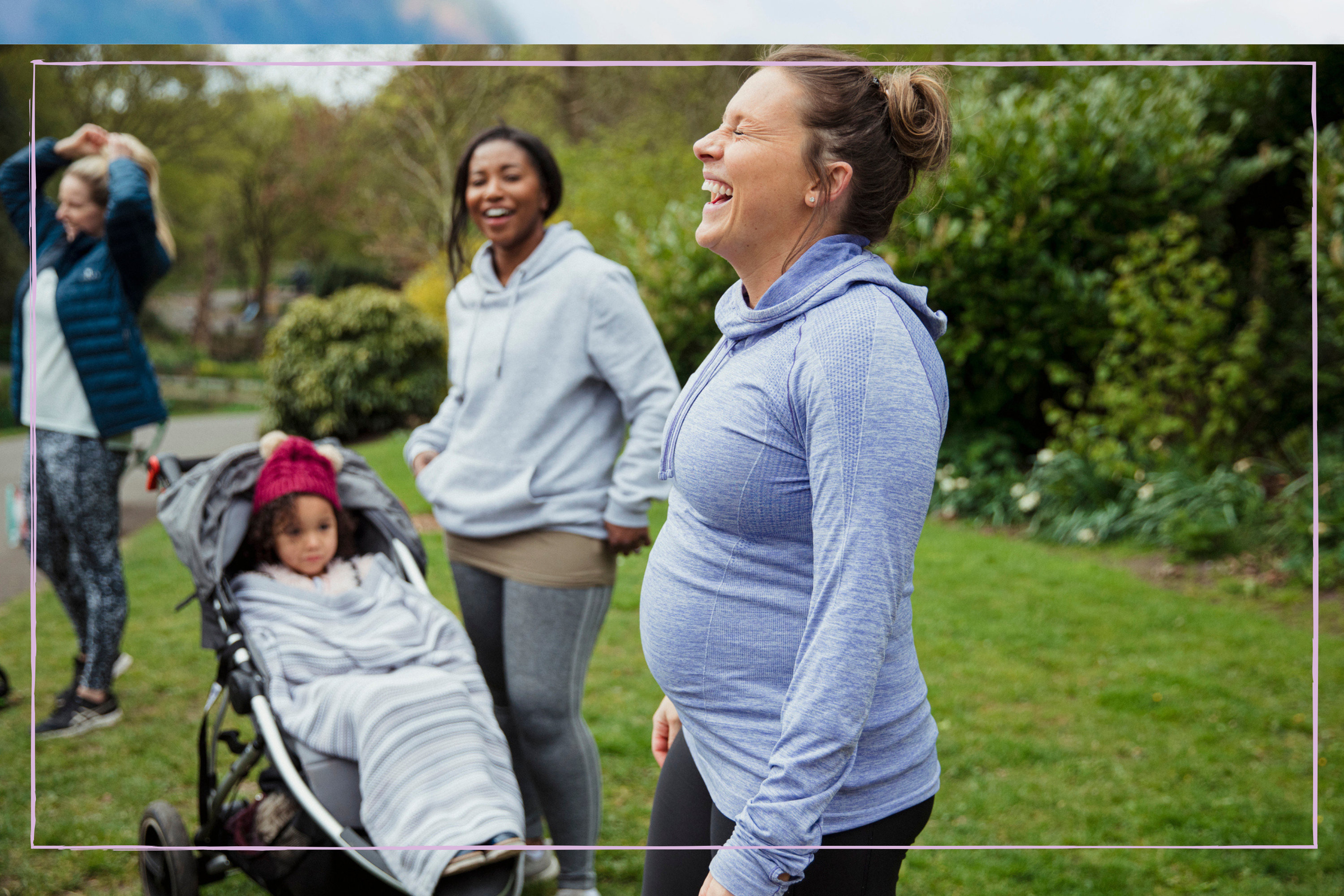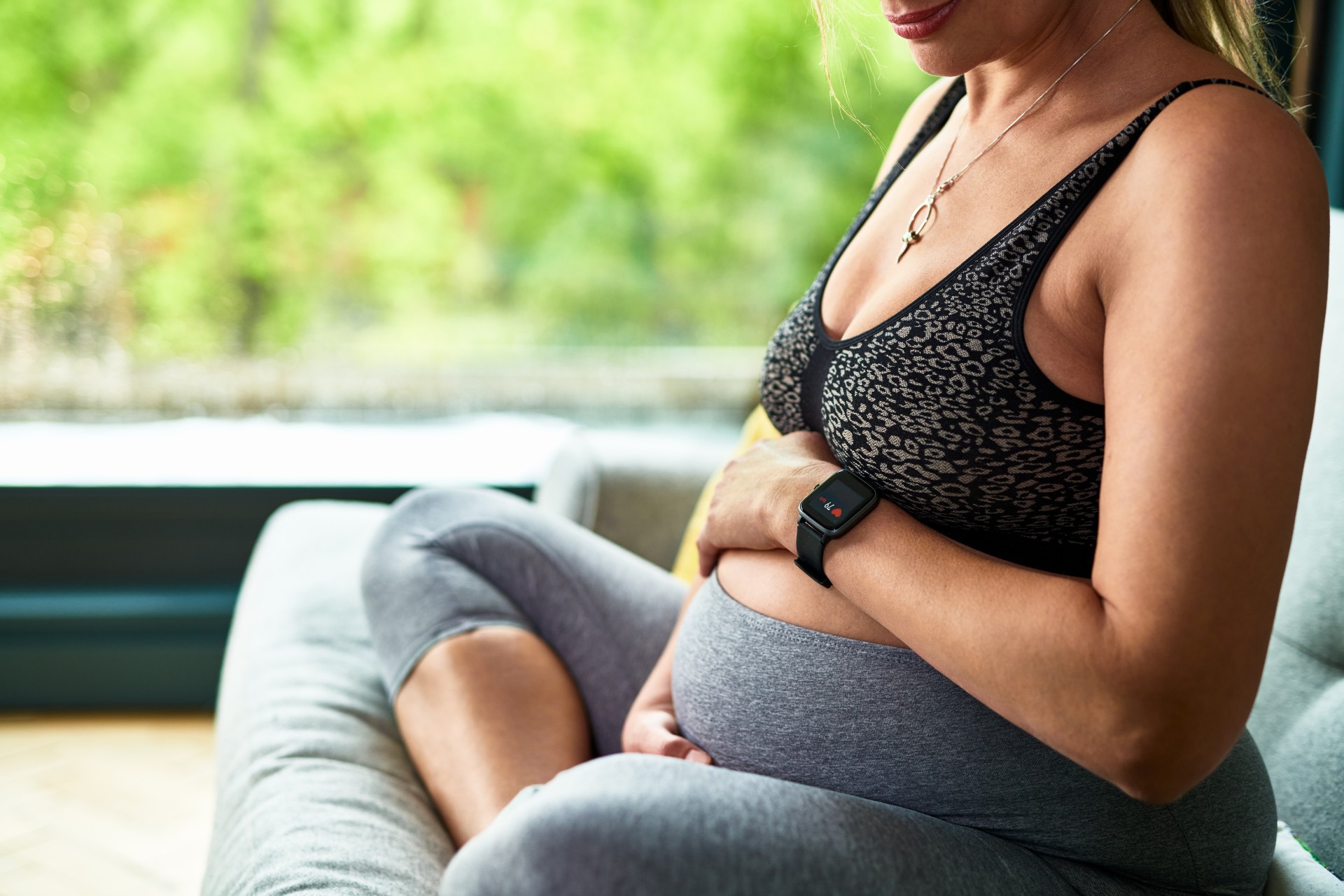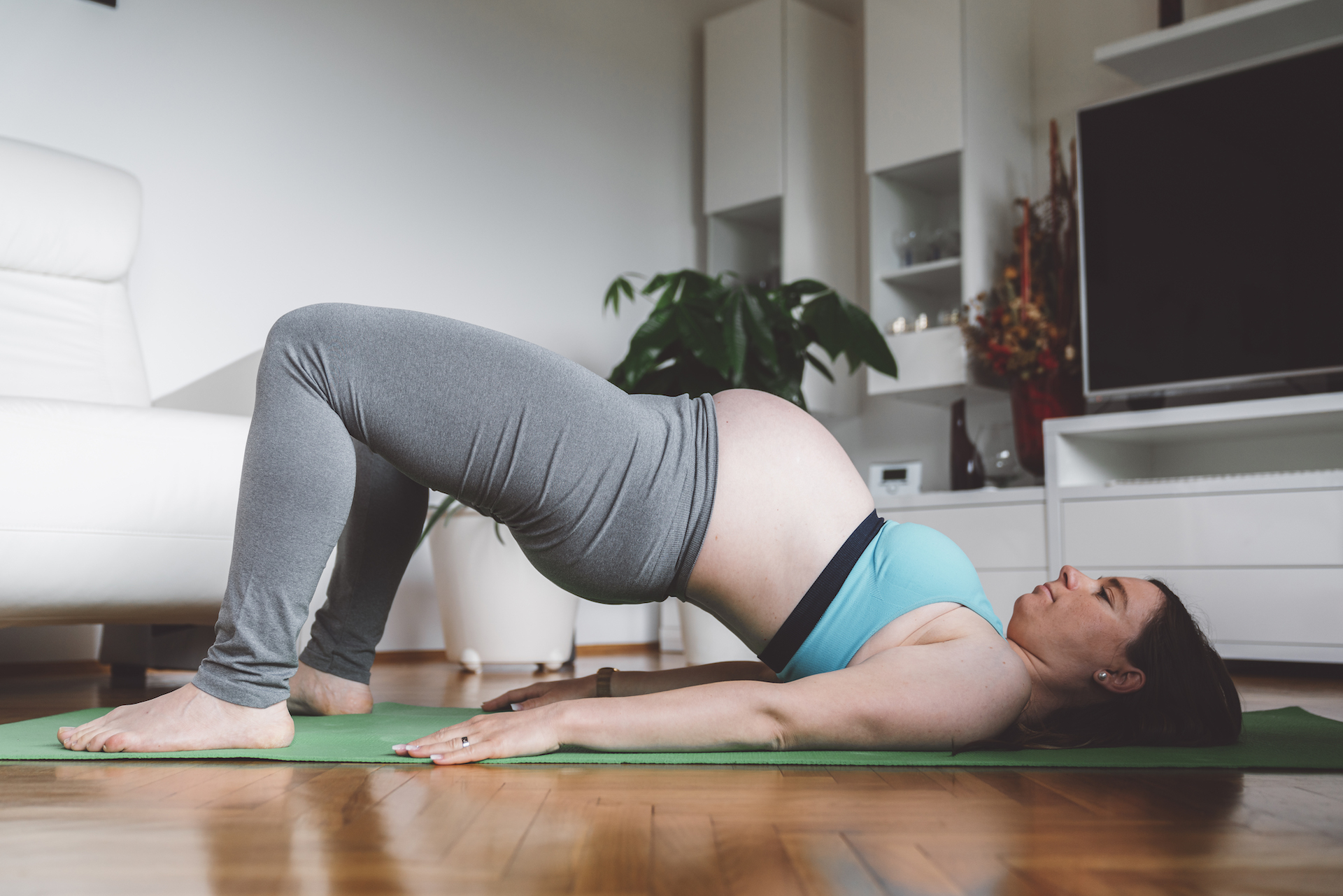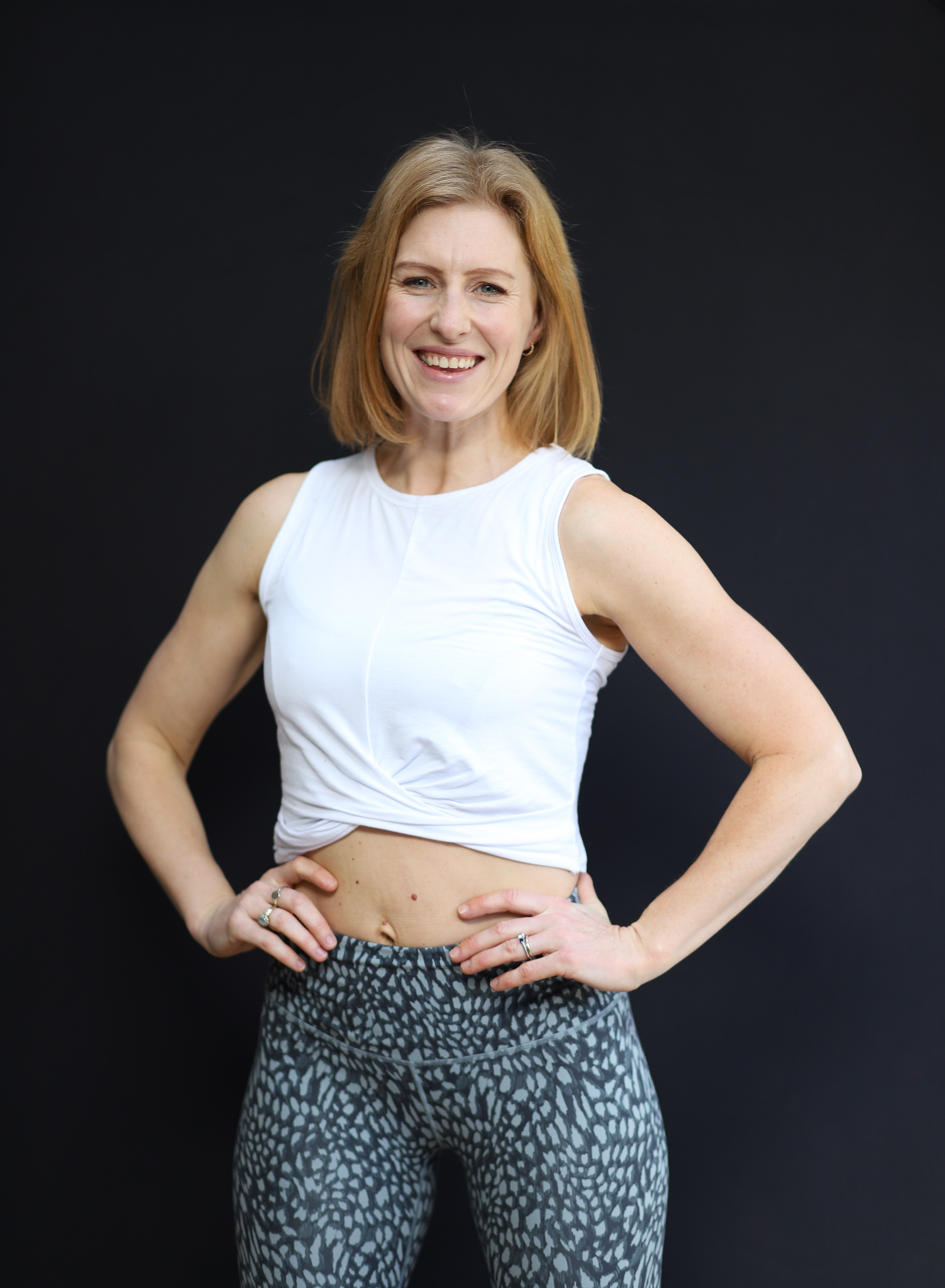7 things prenatal trainers want you know about exercising safely in pregnancy - plus, expert tips for each trimester


Unless you’ve been advised by your GP or midwife not to exercise, there are plenty of benefits to getting active in pregnancy. We've spoken to three pre-and postnatal trainers for their expert advice on staying safe and tips for each trimester.
Research highlights many benefits of exercising in pregnancy. "An active pregnancy can help reduce pregnancy back pain and pelvic discomfort, and maintain good posture", says pre and postnatal exercise specialist Shakira Akabusi - author of The Strong Like Mum Method book (Amazon, £15).
Benefits also include a reduction in hypertensive disorders (those relating to high blood pressure), better cardiorespiratory fitness (comprising the heart, blood vessels and lungs), lower pregnancy weight gain, and a reduction in the risk of developing gestational diabetes. As well as:
- Increased energy
- Better sleep
- Improved mood
- Reduced risk of constipation
- Reduced risk of back pain
Additionally, there's evidence to suggest that exercise can also help reduce the risk of complications during pregnancy and childbirth, plus it can help speed up recovery times post-birth. Keeping active also helps your body deal with the physical strains it’s placed under both during and after pregnancy. And, research has found keeping fit during pregnancy may help reduce the risk of a child developing high blood pressure later in life.
Bear in mind, it’s likely that your energy levels and mood will fluctuate during your pregnancy so it’s important to be mindful of how you are feeling on any given day. But on the whole, staying fit and well is really important for both mother and baby in all three trimesters.
7 things prenatal trainers want you know
1. Stick to a moderate intensity
It’s important to avoid intense exertion when exercising in pregnancy, as your oxygen supply becomes the baby's oxygen supply too. It’s OK to get a little out of breath, but anything that leaves you gasping for air should be avoided.
"Exercise during pregnancy can keep you energised and strong enough to carry a baby," says Anna Kaiser, a certified pre- and postnatal trainer, and founder of Anna Kaiser studios. "Elevating your heart rate will help stimulate blood flow, reduce inflammation, increase energy and beat those baby blues, as long as you don't push yourself beyond what you're used to."
Parenting advice, hot topics, best buys and family finance tips delivered straight to your inbox.
“A good indicator is the ‘talk test’,” says Rosie Stockley, an ante and postnatal exercise specialist and the founder of video workout platform Mamawell. “You should always be able to hold a conversation, even if you’re a bit out of breath.” It’s vital to be mindful of not holding your breath, too, she adds.
So does that rule out high-impact exercises? Not necessarily. “Running, jumping jacks, etc are fine if they're comfortable for you,” says pre- and postnatal fitness expert Hollie Grant – although she does suggest giving them a miss if they're "causing you to leak urine or faeces, or [break] wind.”
2. It's important to stay strong
Official guidance from the UK’s Chief Medical Officer states that you should aim to do 150 minutes of moderate-intensity exercise a week, along with two strength-building activities.
“The legs, glutes, pelvis, abdominals and lower back need to be strong to support the growing baby,” explains Anna, “Meanwhile, the upper back and chest need to be strong to support growing breasts and all the carrying that will need to be done post birth."
She adds, "Although it's almost impossible to build new muscle during pregnancy due to hormones, it's essential to maintain the muscle you already have so that you are prepared for your baby. Try incorporating strength training at least two times per week, along with any kind of cardio that makes you feel good."
3. Stay hydrated
It's important for pregnant women to stay hydrated when they exercise to help maintain blood flow and regulate body temperature.
"You’re likely going to be peeing more often (due to your uterus squashing your bladder and reducing its volume) and, during pregnancy, we require more fluid in the body," says Hollie.
4. Beware of overheating
You should avoid raising your internal temperature too dramatically when exercising during pregnancy, as this could be harmful to you and your baby.
This is because the body combats overheating by diverting blood towards the surface of the skin in an effort to cool down, which in turn diverts blood away from vital internal organs. Overheating also increases your chances of dehydration and fainting. Hollie therefore advises: "Aim to wear layers that can be removed, open a window or avoid exercising during hot periods, unless you can find shade."
5. A good sports bra is vital
“Towards the later stages of pregnancy, we may notice a significant change in the size and weight of our breast tissue, so we may need more support," says Hollie, who warns: "The ligaments of the breasts are important and can be damaged if they aren’t supported.
She recommends Natal Active, Latched and Jorgen House for a fantastic range of maternity sports bras.

6. It's important to listen to your body
Feeling tired is common in the early weeks of pregnancy, so be sure to honour how your body is feeling and rest where needed. "There will be some days where your growing baby will zap all your energy (they’re growing at a rapid rate, after all) and others where you feel fantastic. Listen to your body and do what feels right on the day," advises Hollie.
7. Adapt your workouts during pregnancy
During pregnancy, your body goes through such a physical transformation, that it’s important that any exercise both supports and adapts around these changes. “The exercises which are easiest or best will change throughout pregnancy,” explains NHS doctor Dr Dawn Harper.
One key example is exercises that require you to lie flat on your back. NHS guidelines state you should avoid lying on your back for prolonged periods from 16 weeks onwards – which has obvious implications for activities such as Pilates and yoga.
Mixing up your workout routine can help you continue to exercise on your back, provided you stick to short periods of time and that it feels comfortable for you.
Hollie suggests an example routine:
- Start with side-leg lifts on your left-hand side
- Roll onto your back to do glute bridges for 30 seconds to a minute
- Come up to sitting and do some rowing with a resistance band
- Flip onto hands and knees to do glute kick-backs, working the left-hand side again
- Lie on your right-hand side and repeat the routine again on the opposite side

Exercising in your first trimester
If you were active prior to pregnancy, you can generally carry on exercising as you did previously in your first trimester, provided you stick to a moderate level of intensity and avoid the activities deemed a no-no by the official guidelines. And if you weren’t physically active before getting pregnant, it’s important to start gradually.
In both scenarios, it is important to be happy and comfortable with any activity that you do, and to pay attention to how your body feels. "Physically not much has changed on the outside, but there are many hormonal adaptations as the baby begins to grow," says Rosie.
Feelings of tiredness are common in the early weeks of pregnancy. You also may be suffering with morning sickness. Be sure to honour how your body is feeling and rest where needed. "You may not feel like doing your normal fitness routine in the first 12 weeks of pregnancy. Instead, a brisk walk may be perfect," says Rosie.
Exercising in your second trimester
Your energy levels often return, making it a great time to get into a regular pregnancy fitness routine. However, you may need to make certain modifications to your workouts.
"You will probably also find that as your pregnancy progresses you may want to reduce the intensity of your workouts,” says Dr Dawn. Shakira recommends aiming for around 70% of your max work rate, ensuring you can still pass the ‘talk test’.
You may also want to start reducing impact exercises, says Shakira, in order to avoid sudden impact in the core. “For example, you might modify burpees so that you’re not jumping up and back. Instead, you might reach up, then put your hands onto a bench or chair and step out. You may well find that swimming and yoga are easier than jogging," adds Dr Dawn.
Exercising in your third trimester
The growing weight of your bump and demands on your body may mean that you want to further reduce the intensity of exercise in your third trimester. “Many women feel more fatigued and on some days might not feel like working out – or you might need to take longer breaks," Rosie says.
Certain positions may also prove more challenging, such as a four-point kneeling position. “Towards the end of the third trimester, some women start to feel that being on all fours places too much pressure onto the front abdominal wall, in which case we can raise our hands up onto a platform,” says Shakira.
Some women struggle with carpal tunnel syndrome, particularly in the third trimester, so you may need to adapt any workouts on your hands in order to feel comfortable. “Some of my clients find doing something on their hands and knees more comfortable on their fists as opposed to their palm being flat,” says Shakira. “But then other people find the opposite, and find being on their fists aggravating.”
Others find that their feet flatten as pregnancy progresses. “This can impact the core and pelvic floor, as the shock absorption from your feet isn’t as efficient,” says Shakira. She advises adding some arch rehab exercises into your routine. “Put a paper towel under your foot and then try to crunch it up with your toes to build strength in your arch,” she suggests.
The information on GoodTo.com does not constitute medical or other health advice or diagnosis and should not be used as such. Although GoodtoKnow consults a range of medical experts to create and fact-check content, this information is for general purposes only and does not take the place of medical advice. Always seek the guidance of a qualified health professional or seek urgent medical attention if needed.

Shakira is a qualified pre- and postnatal fitness trainer and the founder of Strong Like Mum, a platform that supports the wellbeing of new mums and pregnant women. She is the host of the Strong Like Mum podcast and the author of The Strong Like Mum Method (from £3.99, Amazon), which promises to “awaken the power of your pre and postnatal body through instinct, knowledge and exercise.” She regularly appears as a fitness expert on TV shows including This Morning and Good Morning Britain.

Rosie Stockley is a female fitness specialist with 20 years' experience. Mamawell was founded by Rosie after her postpartum recovery. Rosie's qualifications include a YMCA – L3 Ante & Post Natal Training, National Council on Strength & Fitness (NCSF), EFTI (Equinox Fitness Training Institute) and RAD (Royal Academy of Dance). Alongside caring for her daughters, Rosie aims to empower women to use their bodies to give them strength and energy throughout their pregnancy, childbirth and life afterwards.

Hollie Grant is the founder of Pilates PT and creator of pre and postnatal exercise platform The Bump Plan. As a Tatler award-winning personal trainer, highly experienced Pilates expert and advanced prenatal specialist, Hollie is passionate about encouraging women to think of their bodies not by dress size, but by its function, performance and capabilities. After training with STOTT and working with over 40,000 women across the globe for 10 years, Hollie now runs a successful fitness brand, including a personal training studio in London, two online memberships (Pilates On Demand and The Bump Plan) and is host of the Bun in the Oven podcast. Hollie’s mission is to empower, educate and motivate you to become the fittest and healthiest you can be.

Anna Kaiser is an American fitness authority and entrepreneur. After earning a BFA in Dance from the University of California in 2002 (Cum Laude), she studied kinesiology, sports medicine, and functional anatomy at Mount Sinai Medical Center. She then went on to acquire teaching certificates in Pre/Post Natal, Pilates, TRX (Total Body Resistance Exercise), and NASM (The National Academy of Sports Medicine). Her reputation for results quickly made her the preferred trainer of such celebrities as Kelly Ripa, Shakira, Karlie Kloss, Alicia Keys, and Sarah Jessica Parker. Her first DVD, Expecting More: The Complete Pregnancy Fitness System for Fit and Healthy Moms-to-Be, received rave reviews internationally and received a gold medal at the National Parenting Publications Awards.

Stephanie is former Acting Editor and Content Director at GoodToKnow. She is also mum to son Woody (don't worry, they don't share a surname!), who was born in November 2021. As a journalist, Stephanie has over 17 years' of experience, and has worked as a digital editor and writer for brands including Stylist, Fit&Well, MSN and Woman&Home.